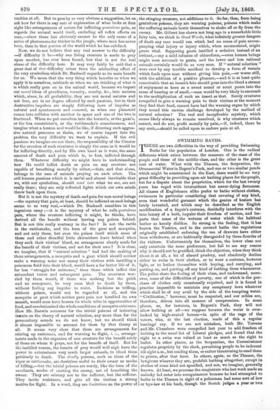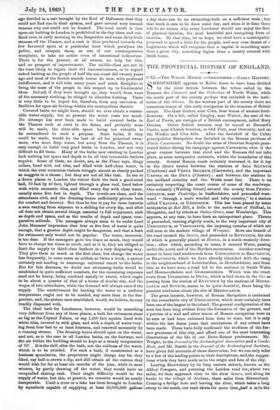SWIMMING BATHS.
THERE are two difficulties in the way of providing Swimming
Baths for the population of London. One is the radical difference which exists between the manners of the mass of the people and those of the middle-class, and the other is the great cost of water. What with the Thames, the Serpentine, the Ornamental Water in Regent's Park, and one or two similar ponds which might be constructed in the East, there would be no very great difficulty in providing open-air bathing places for the people, but for a dispute about the proprieties, which for the last twenty years has raged with intermittent but never-dying fierceness. All classes of Englishmen alike prefer to bathe without clothes, swimmers in particular considering that covering of any kind, even that wonderful garment which the genius of hosiers has lately invented, and which may be described as the English modification of a faquir's costume, decidedly interferes with the true luxury of a bath, impairs their freedom of motion, and im- parts that sense of the wetness of water which the habitual bather so keenly dislikes. So strong is the feeling, that it has beaten the Vestries, and in the covered baths the regulations originally established enforcing the use of drawers have either been withdrawn, or are habitually disregarded by three-fourths of the visitors. Unfortunately for themselves, the lower class not only entertain the same preference, but fail to see any reason why it should not be gratified, think the objection, when they think about it at all, a bit of absurd prudery, and absolutely decline either to swim in their clothes, or to wear a costume, however light, or to bother themselves with buying, and carrying, and putting on, and putting off any kind of bathing dress whatsoever_ The police share the feeling of their class, and understand, more- over, some of the difficulties of poverty, one of which is the pur- chase of clothes only occasionally required, and it is found in practice impossible to maintain any sumptuary laws whatever which shall be of any avail by the side of the tempting water. "Civilization," however, must be respected, and our sullies are, therefore, driven into all manner of compromises. In some places, as, for instance, in Regent's Park, they will not allow bathing at all—we suppose because the water is over- looked by high-rented houses—in spite of the rage of the voters, who, at the last election, made of this a regular hustings' cry. If we are not mistaken, both Mr. Torrens and Mr. Chambers were compelled last year to add freedom of bathing to the usual list of Liberal pledges, and found that the right to a swim was valued at least as much as the right to ballot. In other places, as the Serpentine, the Commissioner regulates propriety by the clock, permitting people to be indecent till eight a.m., but sending them, or rather threatening to send them to prison, after that hour. In others, again, as the Thames, the lawgivers whoever they are, prohibit bathing altogether, except in elothes of some kind not specified, and not, we imagine, generally known. At least, we presume the magistrate who last week made an unlucky lad enter into recognizances because he had attempted to bathe in the Thames in sight of a policeman had some sort of law or bye-law at his back, though the Scotch judges a year or two ago decided in a suit brought by the Earl of Dalhousie that they could not find one in their system, and gave several very learned reasons why one could not be framed. The total result is that open-air bathing in London is prohibited in the day-time, and con- fined even in early morning to the Serpentine and some dirty little streams off the Thames, and a rush is thus produced towards the few favoured spots at a particular hour which paralyzes the police, and compels them, as one of our contemporaries complains, to take no notice even of intentional indecorum. There is for the present, at all events, no help for this, and no prospect of improvement. The middle-class are not in the least likely to regain their old unconsciousness, or to regard naked bathing as the people of half the sea-coast did twenty years ago and most of the Scotch seaside towns do now, with profound indifference, and it will take many years and much discipline to bring the mass of the people in this respect up to Continental ideas. Ind3ed, if they were brought up, they would, from want of the necessary clothing, be obliged to abandon bathing. There is very little to be hoped for, therefore, from any extension of facilities for open-air bathing within the metropolitan district.
Covered baths we might have, should we ever obtain a reason- able water-supply, but at present the water costa too much. No attempt has ever been made to build covered baths in the Thames such as exist in the Seine, and probably none will be made, the river-side space being too valuable to be surrendered to such a purpose. Such baths, if they could be made, would be the best of all for practised swim- -mere, who want deep water, but away from the Thames, it is easy enough to build very good baths in London, and not very difficult to fill them. Many of the baths now existing in London lack nothing but space and depth to be all that reasonable bathers require. Some of them, no doubt, are, as the Times says, dingy cellars, lined with red tiles, and filled with half-clean water, in which the over numerous visitors struggle almost as closely packed as maggots in a cheese ; but they are not all like that. In ten or a. dozen places in London the visitor finds the bath a good-sized hall, 70 feet by 40 feet, lighted through a glass roof, lined below with white encaustic tiles, and filled every day with clear water, usually some five feet in depth. The towels are clean, and the attendants civil, and the dressing-boxes sufficiently private both for comfort and decency. But then he has to pay for these luxuries a sum varying from sixpence to a shilling for every dip, and after all does not obtain several things essential to full enjoyment, such as depth and space, and as the results of depth and space, com- parative solitude. The managers always seem to be under Lord -John Manners' impression that four or five feet of water is quite enough, that a greater depth might be dangerous, and that a bath for swimmers only would not be popular. The water, moreover, is too dear. If the managers gave ten times as much, they would have to charge ten times as much, and as it is, they are obliged to .limit the supply to third-class bathers in a very disgusting way. They give them as much as the first class, but change the water less frequently, in some cases as seldom as twice a week, a system certainly not tending to encourage universal resort to the baths. But for this dearness, we doubt not swimming-baths would be established in quite sufficient numbers, for the remaining expenses need not be heavy, being confined mainly to rental, which ought to be about a quarter of that of a house of similar size, and the wages of two attendants, while the demand will always exceed the supply. The contrivances for heating the water to a uniform temperature ought not to be needed, any more than in the Ser- pentine, and, the system once established, would, we believe, be very readily dispensed with.
The ideal bath for Londoners, however, would be something very different from any of these places, a bath for swimmers alone -as big as the Crystal Palace, or say 1,000 feet square, lined with white tiles, covered in with glass, and with a depth of water vary- ing from four feet to at least fourteen, and renewed momently by
• a running stream. The dressing-boxes should open on the water, -and not, as is the case in all London baths, on the footway, and the air within the building should be kept at a steady temperature of 70°. It is the chill after the bath, not the coldness of the water, which is to be avoided. For such a bath, if constructed as a business speculation, the proprietors might charge any fee they liked, say half-a-crown a dip, and still obtain all the custom they would wish for for at least six months of the year, while in most winters, by partly drawing off the water, they would have an unequalled skating rink. Their single difficulty would be the supply of water, but this, at present, we conceive would be nearly insuperable. Until a river or a lake has been brought to London by aqueducts capable of supplying at least 50,000,000 gallons a day there can be no swimming-bath on a sufficient scale ; but that work is sure to be done some day, and when it is done there will be no reason why every Londoner should not enjoy the first of physical luxuries, the most healthful and energizing form of exercise. By that time, let us hope, we shall have a municipality prepared to spend a little for the people, and may even dream of a Legislature which will recognize that a capital is something more than a great city, something higher than a county covered with brick boxes.































 Previous page
Previous page